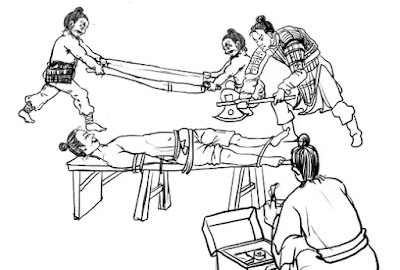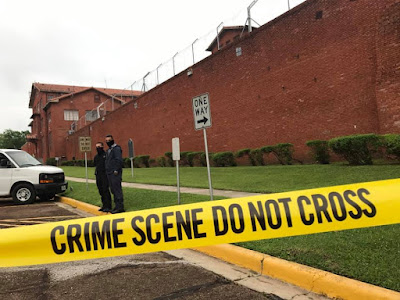 |
| Arizona's death chamber |
What's the best way to kill a death-row prisoner?
In response to a lawsuit filed on behalf of seven other Arizona death-row inmates, a U.S. District Court judge slapped an injunction on executions. Lawyers for the prisoners, meanwhile, have made the state revise an execution method that gave total discretion to Corrections Director Charles Ryan.
The department published its most recent execution plan, known as a protocol, on May 30.
It yields to most of the demands set forth by attorneys from the Los Angeles office of the law firm Sidley Austin and the Federal Public Defender's Office in Phoenix.
Changes in the latest protocol:
- Strip Ryan's ability to make last-minute drug changes or discretionary decisions, such as closing curtains into the execution chamber if things go wrong.
- Eliminate a traditional three-drug combination that defense attorneys believe merely masks any sign of pain or distress. A new single-drug protocol takes its place.
- Remove a clause saying that defense attorneys may obtain their own drugs for their clients' executions if they pass quality standards. Execution drugs, for the most part, are controlled substances that are only available to persons or entities licensed to obtain them.
Judge Neil Wake
scheduled a September trial for the case, but whether it plays out or the case settles remains to be seen. All of the suit's demands appear to have been agreed upon, except for a matter of attorneys fees, which Wake ordered be paid to the defense attorneys. A hearing is set for June 12.
No executions can go forward in Arizona until the case is settled or adjudicated and the judge lifts his injunction.
The Corrections Department did not comment on the matter, nor did attorneys for the Federal Public Defender's Office.
Execution drugs focus of another lawsuit
Meanwhile, a second case pertaining to lethal injection is set for trial in late July before U.S. District Judge G. Murray Snow. That case focuses on whether the state must be more transparent in revealing details about the execution drugs it obtains and the people who administer them.
Much has changed as a result of the two lawsuits since the 2014 Wood execution.
Because other, more-efficient drugs were not available at that time, Wood was put to death using a cocktail of a Valium-like drug called midazolam and a narcotic called hydrocodone. One dose was supposed to be lethal, but Wood lingered. Ryan himself made the decision to inject him repeatedly with more doses until he finally died.
Ryan will not be able to make such decisions under the terms of the new protocol, nor will they be allowed to arise. Wake has insisted that the case be fully litigated because of Ryan's history of signing off on a protocol and then unilaterally changing it shortly before scheduled executions.
A clause in the previous protocol that said it "does not create any legally enforceable rights or obligations" has been removed from the latest version.
The department has had difficulty finding execution drugs since 2010, when The Arizona Republic disclosed that Arizona and other states were illegally obtaining a drug called sodium thiopental from Britain. The U.S. Food and Drug Administration shut down importation of the drug. Britain and other European countries also blocked its export because executions are not legal there.
At Ryan's last-minute order, Corrections switched to a barbiturate called pentobarbital in a three-drug combination, and then later made another last-minute change to use it as a single drug because one of the other drugs had passed its expiration date.
Also, the department removed the so-called three-drug protocols, which start with thiopental or pentobarbital and include a paralytic drug that stops breathing or other movement and would mask any pain caused by the third drug, which stops the heart.
Instead, the remaining options are one-drug protocols using thiopental — which currently is not available in the U.S., though Arizona and other states are lobbying for new import rules — or pentobarbital, which pharma manufacturers refuse to sell for executions but which can be made in compounding pharmacies.
The department also will be forced under an order by Snow to
allow journalists and other witnesses to watch as the condemned person is led into the death chamber and strapped down. The judge also ordered the placement of another camera over the control board from which injections are pushed so the process may be observed.
:
AZ Central, Michael Kieffer, June 5, 2017
⚑ | Report an error, an omission, a typo; suggest a story or a new angle to an existing story; submit a piece, a comment; recommend a resource; contact the webmaster, contact us:
deathpenaltynews@gmail.com.
Opposed to Capital Punishment? Help us keep this blog up and running! DONATE!






.jpg)





